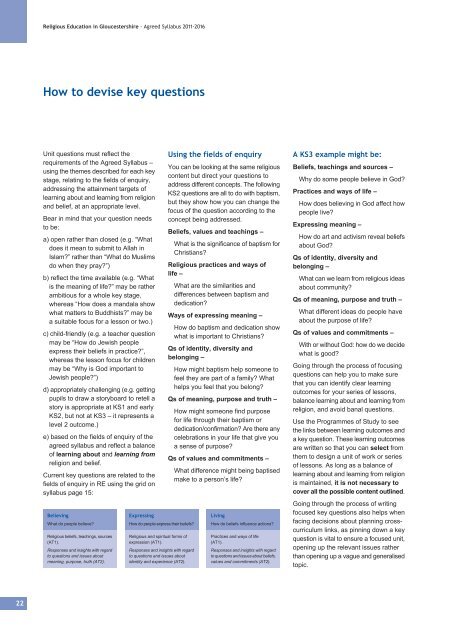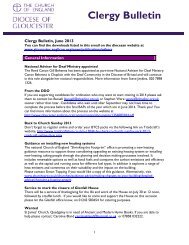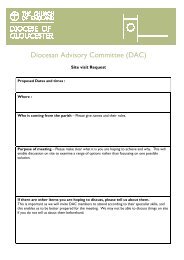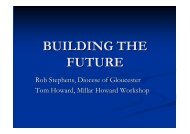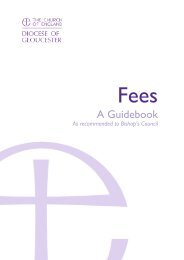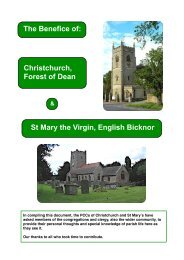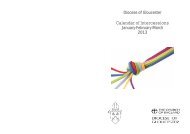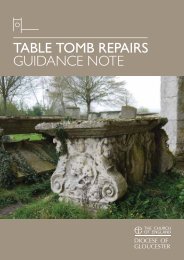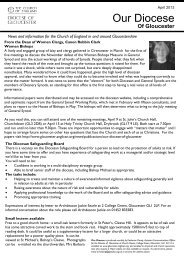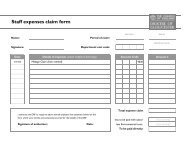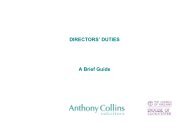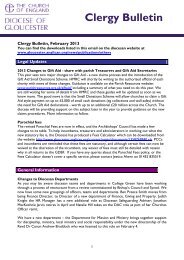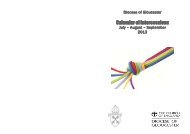Download the Revised RE Syllabus 2011 - Diocese of Gloucester
Download the Revised RE Syllabus 2011 - Diocese of Gloucester
Download the Revised RE Syllabus 2011 - Diocese of Gloucester
Create successful ePaper yourself
Turn your PDF publications into a flip-book with our unique Google optimized e-Paper software.
Religious Education in <strong>Gloucester</strong>shire - Agreed <strong>Syllabus</strong> <strong>2011</strong>-2016<br />
How to devise key questions<br />
Unit questions must reflect <strong>the</strong><br />
requirements <strong>of</strong> <strong>the</strong> Agreed <strong>Syllabus</strong> –<br />
using <strong>the</strong> <strong>the</strong>mes described for each key<br />
stage, relating to <strong>the</strong> fields <strong>of</strong> enquiry,<br />
addressing <strong>the</strong> attainment targets <strong>of</strong><br />
learning about and learning from religion<br />
and belief, at an appropriate level.<br />
Bear in mind that your question needs<br />
to be:<br />
a) open ra<strong>the</strong>r than closed (e.g. “What<br />
does it mean to submit to Allah in<br />
Islam” ra<strong>the</strong>r than “What do Muslims<br />
do when <strong>the</strong>y pray”)<br />
b) reflect <strong>the</strong> time available (e.g. “What<br />
is <strong>the</strong> meaning <strong>of</strong> life” may be ra<strong>the</strong>r<br />
ambitious for a whole key stage,<br />
whereas “How does a mandala show<br />
what matters to Buddhists” may be<br />
a suitable focus for a lesson or two.)<br />
c) child-friendly (e.g. a teacher question<br />
may be “How do Jewish people<br />
express <strong>the</strong>ir beliefs in practice”,<br />
whereas <strong>the</strong> lesson focus for children<br />
may be “Why is God important to<br />
Jewish people”)<br />
d) appropriately challenging (e.g. getting<br />
pupils to draw a storyboard to retell a<br />
story is appropriate at KS1 and early<br />
KS2, but not at KS3 – it represents a<br />
level 2 outcome.)<br />
e) based on <strong>the</strong> fields <strong>of</strong> enquiry <strong>of</strong> <strong>the</strong><br />
agreed syllabus and reflect a balance<br />
<strong>of</strong> learning about and learning from<br />
religion and belief.<br />
Current key questions are related to <strong>the</strong><br />
fields <strong>of</strong> enquiry in <strong>RE</strong> using <strong>the</strong> grid on<br />
syllabus page 15:<br />
Believing<br />
What do people believe<br />
Religious beliefs, teachings, sources<br />
(AT1).<br />
Responses and insights with regard<br />
to questions and issues about<br />
meaning, purpose, truth (AT2).<br />
Expressing<br />
How do people express <strong>the</strong>ir beliefs<br />
Religious and spiritual forms <strong>of</strong><br />
expression (AT1).<br />
Responses and insights with regard<br />
to questions and issues about<br />
identity and experience (AT2).<br />
Using <strong>the</strong> fields <strong>of</strong> enquiry<br />
You can be looking at <strong>the</strong> same religious<br />
content but direct your questions to<br />
address different concepts. The following<br />
KS2 questions are all to do with baptism,<br />
but <strong>the</strong>y show how you can change <strong>the</strong><br />
focus <strong>of</strong> <strong>the</strong> question according to <strong>the</strong><br />
concept being addressed.<br />
Beliefs, values and teachings –<br />
What is <strong>the</strong> significance <strong>of</strong> baptism for<br />
Christians<br />
Religious practices and ways <strong>of</strong><br />
life –<br />
What are <strong>the</strong> similarities and<br />
differences between baptism and<br />
dedication<br />
Ways <strong>of</strong> expressing meaning –<br />
How do baptism and dedication show<br />
what is important to Christians<br />
Qs <strong>of</strong> identity, diversity and<br />
belonging –<br />
How might baptism help someone to<br />
feel <strong>the</strong>y are part <strong>of</strong> a family What<br />
helps you feel that you belong<br />
Qs <strong>of</strong> meaning, purpose and truth –<br />
How might someone find purpose<br />
for life through <strong>the</strong>ir baptism or<br />
dedication/confirmation Are <strong>the</strong>re any<br />
celebrations in your life that give you<br />
a sense <strong>of</strong> purpose<br />
Qs <strong>of</strong> values and commitments –<br />
What difference might being baptised<br />
make to a person’s life<br />
Living<br />
How do beliefs influence actions<br />
Practices and ways <strong>of</strong> life<br />
(AT1).<br />
Responses and insights with regard<br />
to questions and issues about beliefs,<br />
values and commitments (AT2).<br />
A KS3 example might be:<br />
Beliefs, teachings and sources –<br />
Why do some people believe in God<br />
Practices and ways <strong>of</strong> life –<br />
How does believing in God affect how<br />
people live<br />
Expressing meaning –<br />
How do art and activism reveal beliefs<br />
about God<br />
Qs <strong>of</strong> identity, diversity and<br />
belonging –<br />
What can we learn from religious ideas<br />
about community<br />
Qs <strong>of</strong> meaning, purpose and truth –<br />
What different ideas do people have<br />
about <strong>the</strong> purpose <strong>of</strong> life<br />
Qs <strong>of</strong> values and commitments –<br />
With or without God: how do we decide<br />
what is good<br />
Going through <strong>the</strong> process <strong>of</strong> focusing<br />
questions can help you to make sure<br />
that you can identify clear learning<br />
outcomes for your series <strong>of</strong> lessons,<br />
balance learning about and learning from<br />
religion, and avoid banal questions.<br />
Use <strong>the</strong> Programmes <strong>of</strong> Study to see<br />
<strong>the</strong> links between learning outcomes and<br />
a key question. These learning outcomes<br />
are written so that you can select from<br />
<strong>the</strong>m to design a unit <strong>of</strong> work or series<br />
<strong>of</strong> lessons. As long as a balance <strong>of</strong><br />
learning about and learning from religion<br />
is maintained, it is not necessary to<br />
cover all <strong>the</strong> possible content outlined.<br />
Going through <strong>the</strong> process <strong>of</strong> writing<br />
focused key questions also helps when<br />
facing decisions about planning crosscurriculum<br />
links, as pinning down a key<br />
question is vital to ensure a focused unit,<br />
opening up <strong>the</strong> relevant issues ra<strong>the</strong>r<br />
than opening up a vague and generalised<br />
topic.<br />
22


